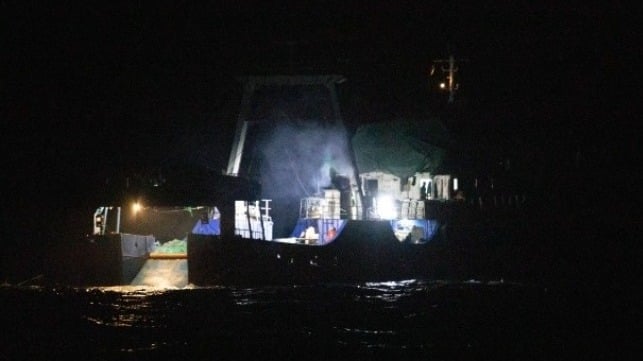Why Shared Governance Could Save Our Oceans

In the summer of 1968, Garrett Hardin published his seminal paper, “The Tragedy of the Commons”, offering a sobering analysis of how shared resources face depletion when individuals act solely in their self-interest, leading to overconsumption, underinvestment, and eventual resource exhaustion. More than 50 years later, Hardin’s insights remain strikingly relevant, resonating through today’s environmental crises, including climate change, pollution, and biodiversity loss.
However, the very factors that make shared resources vulnerable can also provide opportunities for innovative governance models, such as shared governance.
A poignant example of Hardin’s theory is playing out in the world’s oceans, where uncontrolled use has driven marine resources to the brink. As quintessential “commons”, the oceans are shared globally, yet more than 90 percent of fish stocks are fully exploited or overfished, and an estimated eight million metric tonnes of plastic enter the sea annually.
These pressures are further compounded by the accelerating impacts of climate change, including rising sea temperatures, ocean acidification, and deoxygenation. Together, these challenges form a cascade of threats that jeopardize both ocean ecosystem balance and global security. Addressing this crisis requires a paradigm shift in ocean conservation.
Historically, ocean protection has operated predominantly under a top-down model, where governments take the lead in establishing and managing Marine Protected Areas (MPAs) through state agencies. This centralized approach appears logical – public institutions are, after all, charged with the stewardship of shared resources. Governments are often seen as the natural guardians of the public trust, wielding authority, funding, and enforcement capabilities.
However, this traditional paradigm has faced criticism for its limitations, including bureaucratic inefficiencies, lack of community involvement, and challenges in enforcement over vast and often remote marine territories.
Newly published research from Dalhousie University in Canada suggests that top-down governance may not be the most effective approach. The study, which evaluated ecological outcomes across 217 Marine Protected Areas (MPAs) worldwide, found that when MPAs managed through shared governance – where governments collaborate with non-governmental stakeholders, local communities, and Indigenous peoples – fish biomass is nearly double that of areas managed solely by state agencies.
As global leaders gather for the Third United Nations Ocean Conference (UNOC), scheduled for 9-13 June in Nice, France, the shared governance approach couldn’t be more timely.
The Dalhousie study’s findings are further supported by other critical factors. MPAs in wealthier countries tend to perform better, suggesting that economic resources play a role, though they are not the sole determinant. Older MPAs also demonstrated better outcomes, underscoring that conservation is a long-term endeavor requiring sustained effort. Most notably, areas with stricter protections – particularly no-take zones – yielded higher biomass levels. These insights reinforce a crucial truth: meaningful conservation requires genuine restrictions, not symbolic protections.
The idea of shared governance is not new; it has been practiced in various forms globally. For instance, Indigenous peoples have historically governed marine territories using their own legal traditions. In Canada, co-governance arrangements have been recognised as a means to create partnerships between Indigenous nations and the government, thereby integrating traditional knowledge with contemporary management practices. The Gwaii Haanas Agreement exemplifies this approach, allowing for shared jurisdiction between the Haida Nation and the Canadian government over marine and terrestrial areas.
Similarly, in Raja Ampat, Indonesia, often referred to as the “Crown Jewel of the Coral Triangle,” the Fish Forever program exemplifies the benefits of shared governance in a different context. This program, spearheaded by the non-profit Rare, employs a Managed Access and Reserves model, which grants fishing rights to local communities in designated areas while establishing fishing-free reserves nearby. By integrating MPAs with traditional fisheries management practices, the program fosters ecological resilience and empowers local communities to sustainably manage their resources.
These programs’ practices align with the Dalhousie study’s conclusions, demonstrating the efficacy of shared governance, fostering a sense of ownership and accountability among participants, bringing diverse perspectives – indigenous knowledge and scientific data – as well as monitoring and enforcement.
While promising, shared governance is not a panacea. True progress demands power-sharing and collaborative decision-making at every level. The 2023 Agreement on the Conservation and Sustainable Use of Marine Biological Diversity of Areas Beyond National Jurisdiction (BBNJ Agreement) marks a significant step in this direction. Aimed at protecting ocean areas outside national borders, the agreement emphasizes cross-sectoral collaboration, finding support in a recent World Economic Forum report.
As global leaders gather for the Third United Nations Ocean Conference (UNOC), scheduled for 9-13 June in Nice, France, the shared governance approach couldn’t be more timely. The conference aims to accelerate actions and mobilize all actors to conserve and sustainably use the ocean, aligning with Sustainable Development Goal 14.
At this pivotal moment in ocean conservation, we face a choice. The “Tragedy of the Commons” need not define the future. Shared governance offers a compelling alternative, showing that by embracing collaborative approaches, we can transform our oceans from a resource at risk to one of abundance. This is not merely about boosting fish biomass or meeting conservation targets. It is about fostering ecosystems resilient to climate change, ensuring food security for billions, and preserving the livelihoods of coastal communities.

that matters most
Get the latest maritime news delivered to your inbox daily.
Mohd. Yunus is an independent researcher hailing from Riau Province, Indonesia, and is currently pursuing a master’s degree in biological sciences at Khon Kaen University, Thailand. He has more than ten years of experience in ecology, environmental economics, environmental management, peatlands, and sustainability. He has written for the South China Morning Post, The East Asia Forum, The Diplomat, Modern Diplomacy, Asia Times, and Riau Pos focused on environmental issues in Asia. He was awarded the prestigious ITTO Fellowship in 2023 for his ground breaking research on peatland management in Indonesia.
This article appears courtesy of The Lowy Interpreter and may be found in its original form here.
The opinions expressed herein are the author's and not necessarily those of The Maritime Executive.
